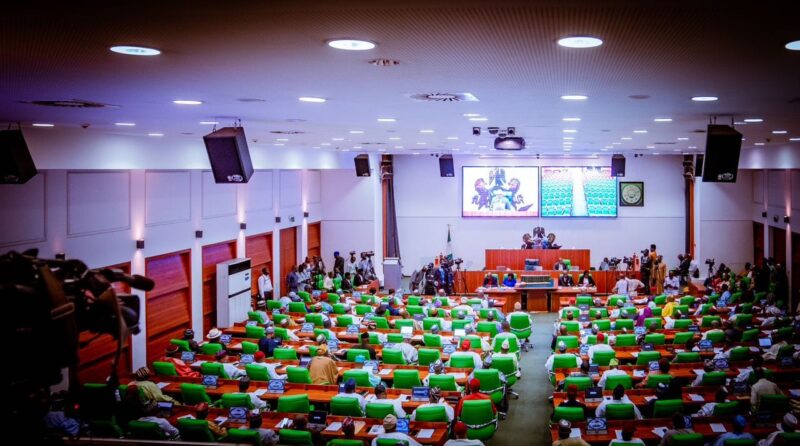The House of Representatives has challenged one of its members, Ibrahim Auyo (APC, Jigawa), to substantiate his claim that federal lawmakers pay between ₦1 million and ₦3 million to present bills, motions, and petitions on the floor of the chamber.
Mr Auyo made the allegations during a meeting with constituents in Jigawa State on Thursday.
In a viral video recorded in Hausa, the lawmaker, first elected in 2015, responded to criticism over his limited record in sponsoring bills and motions by alleging that the process is financially prohibitive.
He said, “Since I was elected as a member in 2015, no individual has given me a bill to pass, either from Auyo, Hadejia, or Kafin Hausa. They are just pretending,” he said.
“And also, even the bills and petitions are paid for. You have to pay from N3 million, N2 million, or N1 million to present it.
“And after you present the bill, you must follow up by lobbying the whole 360 members of the House to accept the bill.”
Mr Auyo also defended his record on youth empowerment, claiming that 80 per cent of his constituency projects target young people, although he alleged that some beneficiaries sell the items they receive.
“I do distribute my things [empowerment] myself, and 80 per cent out of 100 per cent is for youths, I swear to Almighty Allah.
“My first motorcycle and car distribution was distributed to the youths. No single elderly person benefited. Just recently, during the governor’s empowerment in Auyo LGA, all the beneficiaries were youths.

“You bought [an empowerment item] at N300,000; they sell it for N150,000 immediately after collecting it,” he added.
Countering claims
However, the House of Representatives swiftly moved to counter his claims.
In a statement on Friday, Akin Rotimi, the spokesperson for the House, said such allegations are “unsubstantiated” and risk undermining public trust in the National Assembly if not backed by evidence.
“Statements of this nature must be backed by verifiable facts and presented through the appropriate parliamentary channels,” Mr Rotimi said.
According to him, the legislature operates under “well-established and transparent procedures” for introducing bills, motions, and petitions, procedures grounded in the constitution and the House Standing Orders.
“The insinuation that sponsoring a motion or bill is a ‘contract job’ involving bribes is inconsistent with these processes and must be clarified,” he stated.
Lawmaker to face ethics panel
Mr Rotimi said Mr Auyo will be invited to substantiate his claims when the House reconvenes.
He said failure to provide evidence by the Jigawa lawmaker will see the matter referred to the House Committee on Ethics and Privileges “for appropriate consideration, in line with parliamentary procedure.”
He stressed that the House is committed to fostering mutual respect among members while upholding the dignity of parliament.
Efforts to contact Mr Auyo were unsuccessful, as his phone remained switched off at the time of this report.
A history of controversy in the National Assembly
The allegation adds to a long list of public distrust issues surrounding Nigeria’s legislature.
Over the years, the National Assembly has been repeatedly criticised for its opaque operations, especially concerning lawmakers’ salaries and allowances, widely regarded as among the highest in the world.
It has also been embroiled in multiple bribery scandals. One of such cases was in 2012, when then House member Farouk Lawan was accused of accepting a $500,000 bribe during the fuel subsidy probe.
In 2017, former House Appropriations Committee chair Abdulmumin Jibrin accused senior lawmakers of padding the budget, claims that triggered a storm but were eventually swept aside after internal disciplinary action against him.
In the Senate, a similar controversy erupted in March 2024 when Abdul Ningi (PDP, Bauchi Central) accused the National Assembly of padding the 2024 Appropriation Act, claiming that ₦3.7 trillion lacked identifiable projects or locations.
Earlier this year, PREMIUM TIMES reported that senators and members of the House operating through the Senate Committee on Tertiary Education and TETfund and House Committee on University Education allegedly demanded a bribe of N8 million each from university vice chancellors to approve the budgets of their institutions.
Similarly, the “constituency projects” scheme, intended to bring development closer to communities has been dogged by allegations of inflated contracts, ghost projects, and diversion of funds.
For now, all eyes will be on the House when it reconvenes after its current recess in September, as Nigerians wait to see whether Mr Auyo will present evidence or face the ethics panel over remarks that have reignited debate on integrity in the nation’s lawmaking process.









